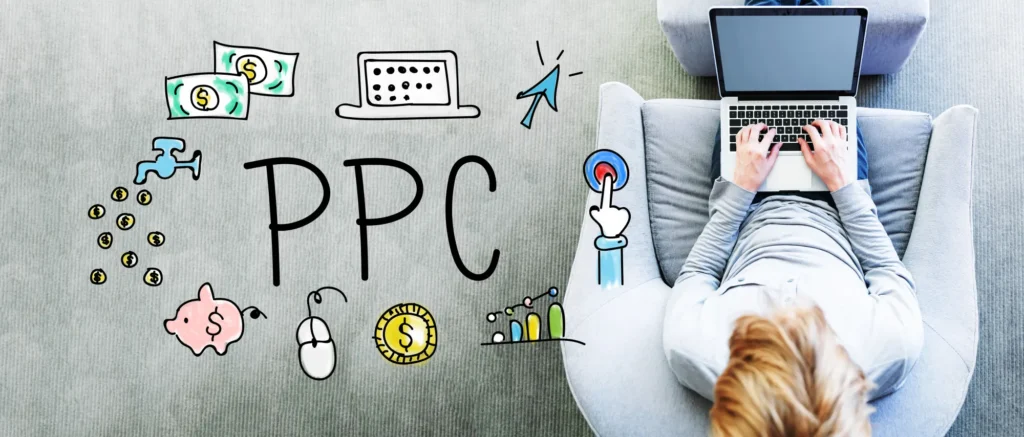Did you know that, according to SmallBizGenius, Google paid ads can cause brand awareness to go up 80%? Additionally, paid advertising has a 200% ROI rate, getting you back $2 for every $1 business owners spend.
If you’re the owner of a small- to medium-sized business in the US, then chances are you’ve been considering using Google’s PPC ad service to build up awareness of your business.
However, if you aren’t sure how to use pay-per-click advertising, you might be feeling stressed about how to get started.
That’s why we’ve put together this PPC advertising guide. In it, you’ll learn everything you need to about Google PPC ads.
Finally, you can put your business on the map, getting more customers and making more money than ever. Read on to learn more.
Header Top Primary Menu
What Is Pay-Per-Click Advertising?
How Does Pay-Per-Click Advertising Work?
Main Navigation
What Is Pay-Per-Click Advertising?
How Does Pay-Per-Click Advertising Work?
What Is Pay-Per-Click Advertising?
PPC advertising, which is short for pay-per-click advertising, is an advertising model used online. What differentiates it from other online advertisements is that the advertiser pays whenever someone clicks on the online ad.
There are several types of PPC ads. These include search ads, remarketing ads, display ads, shopping ads, video ads, Gmail sponsored ads, paid social ads, and Amazon advertising ads.
Search ads are the most common type of PPC ad. Chances are, you’ve seen these pay-per-click sites advertised before when you’ve completed a search on Google.
The word “Ad” will appear next to it, letting you know that it’s a PPC ad.
These PPC ads show up in Google search results because you’ve searched something related to the product or service of the ad.
If you click on the ad, the business the advertisement is for will be paid for only when that happens. But how do these ads work, exactly?
How Does Pay-Per-Click Advertising Work?
If you’ve been wondering, “How does pay-per-click work?” we’ll answer that question in this section. After all, if you aren’t paying for the advertisements unless they get clicked, how does the search engine determine which ads appear where?
Usually, the company paying the most for an advertisement would get a larger spread or a bigger billboard.
The solution works like this. Google and other search engines use what’s called an Ad Auction. This process is automated and determines the validity and relevance of the advertisements that show up in a search.
The Role of Keywords in PPC Advertising
When companies take part in an Ad Auction, it works as a bidding system. You’ll bid on specific terms that would cause your ad to potentially show up in paid Google search results. These terms are called keywords, which you might be familiar with if you’ve used SEO.
Using an example makes this easier to understand. For example, if you sell fishing gear, then one of your potential customers might type “fishing gear” into Google to find a store that sells it.
When the potential customer types in these words, Google’s algorithms calculate which Ad Auction advertisements will show up and in what order.
Because you’re paying whenever people click on your ads, you need to make sure that the keywords you use match up with what you’re selling.
Otherwise, someone might click on your ad, find that what they’re looking for isn’t there, and move on. To get the right ROI, you need to do your keywords research and utilize several other strategies.
Strategies for Getting the Right ROI From Google’s PPC Ads
Strategies for getting the right ROI from Google’s PPC ads include researching keywords, creating ad campaigns and groups, setting your budget and your bid, writing ad copy, and launching your campaign. Let’s review each of these in detail.
Research Keywords
To get started, you need to research what keywords your potential customers are most likely to click on, after which they’ll buy the product you’re selling. Using keyword research tools can be incredibly helpful when doing this, such as Answer the Public.
Another strategy you can use to come up with keywords is by researching industry forums and social media platforms popular among your customers.
Additionally, use any strategies you’ve used to optimize your content marketing with keywords.
If your business is a local brick-and-mortar, you can also target your keywords so that your advertisements only show up for people searching in your area.
As you can imagine, this means that there will be fewer companies you’re competing with when the Ad Auction process occurs.
Create Ad Campaigns and Groups
The next step is to create ad campaigns and groups. Note that your ad campaign can include different ad groups; the idea is that the ad campaign is created to cover a more general topic, while the ad group relates to a more specific topic.
For example, if you sell clothes and you have a new line of swimwear out for the summer, you might have an entire ad campaign dedicated to this line.
However, one ad group could be selling retro one-pieces, while the other ad group could be made to sell modern metallic bikinis.
When you’re setting these up, you’ll be using a process called account hierarchy. The lower down you go, you’ll get more specific.
Your ad campaign will have specific campaign settings, such as keywords, ads, and ad groups. Then, your ad groups will contain targeted keywords and ads that all follow a certain theme.
Finally, there will be ads within each group. Each of these ads has a specific ad copy that features specific words.
Set Your Budget and Your Bid
When you’re putting together your ad campaigns and groups, you need to come up with your budget and your bid. To create your budget, you need to decide how much money you plan to spend on the entire ad campaign.
Remember, this budget is going to be used to cover every single one of your ad groups.
To develop your bid, you need to decide on the maximum bid for each of your ad groups. This is how much you want to pay, maximum, for a potential customer to click on your advertisement.
Depending on the type of Google PPC ad, you can also bid to get customers to convert instead of just clicking.
If you decide that you want to change any of these settings later on, you can. This is the case for all the aspects of your Google PPC ads.
Write the Ad Copy
Writing the copy for your ads might happen before or after you’ve come up with your ad campaign and groups. This will depend on your industry. If you’re in one where ad copy matters a lot, you should start from the ad copy and go from there.
Ad copy includes the headline of the ad as well as the description that follows it.
Google PPC ads usually have a limit on how many words you can include in your ad copy: 30 characters maximum for the headline and 90 characters maximum for the description.
If you include an image or video in your advertisement, you’ll upload it when you upload your copy. Make sure you review its design like you would your web design.
Launch Your Campaign
Next, take a final editorial look at your copy and make sure that you’ve used the right targeting strategies for your ads. Once you’ve done this, you’re ready to launch your PPC campaign. Keep in mind that it won’t show up immediately.
First, Google reviews your ads. Then, they’ll finally start showing up online.
But the work doesn’t stop there. After you’ve launched your campaign, you should manage and optimize your campaign so that it gets you the highest ROI possible over time. To do this, review the data you get about the campaign.
After identifying any trends, you can go back to your ads to change anything you need related to targeting, your landing page, or ad copy. This will make your PPC ads more effective than ever.
Need More Tips for Using Google’s PPC Advertising Effectively?
Now that you’ve reviewed this beginner’s guide to Google’s PPC advertising, you might find that you want additional tips. Maybe you want help crafting the best ad copy to get those clicks. Or maybe you want help finding out which keywords are most relevant.
Whatever you need, we can help. At HAYS Digital Marketing Agency, we’re experts in PPC advertising and other types of digital marketing.
We also offer a variety of digital marketing services. To learn more about how we can help you, contact us now.











